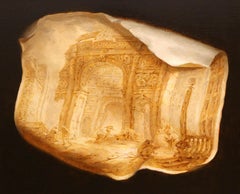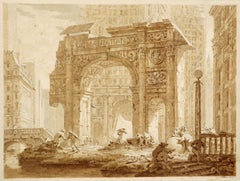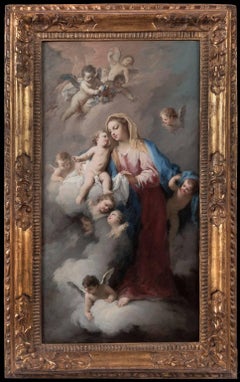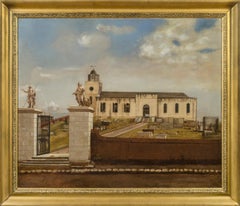Want more images or videos?
Request additional images or videos from the seller
1 of 5
Michael HottesProvisions from Nature1889
1889
$70,000List Price
About the Item
- Creator:Michael Hottes (1852 - 1891)
- Creation Year:1889
- Dimensions:Height: 40.5 in (102.87 cm)Width: 72 in (182.88 cm)
- Medium:
- Movement & Style:
- Period:
- Condition:
- Gallery Location:New York, NY
- Reference Number:1stDibs: LU1025778191
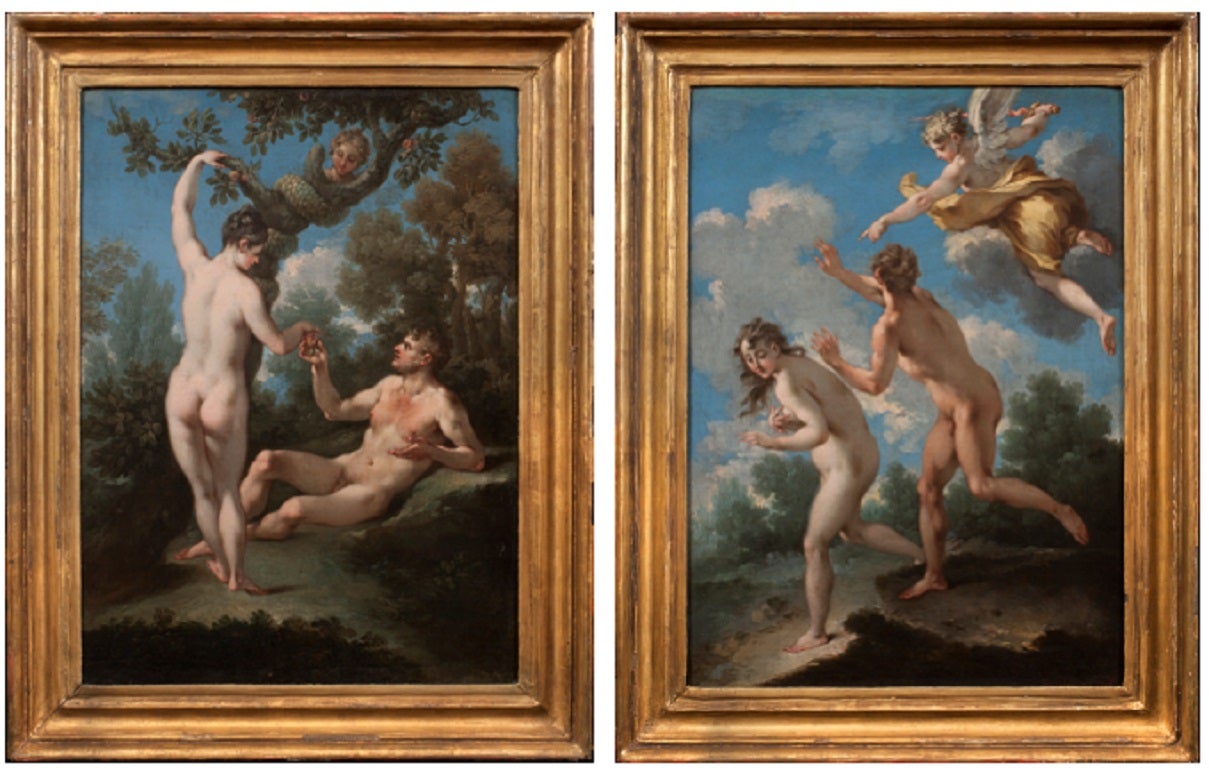
About the Seller
5.0
Recognized Seller
These prestigious sellers are industry leaders and represent the highest echelon for item quality and design.
Established in 1997
1stDibs seller since 2012
22 sales on 1stDibs
Typical response time: 20 hours
Authenticity Guarantee
In the unlikely event there’s an issue with an item’s authenticity, contact us within 1 year for a full refund. DetailsMoney-Back Guarantee
If your item is not as described, is damaged in transit, or does not arrive, contact us within 7 days for a full refund. Details24-Hour Cancellation
You have a 24-hour grace period in which to reconsider your purchase, with no questions asked.Vetted Professional Sellers
Our world-class sellers must adhere to strict standards for service and quality, maintaining the integrity of our listings.Price-Match Guarantee
If you find that a seller listed the same item for a lower price elsewhere, we’ll match it.Trusted Global Delivery
Our best-in-class carrier network provides specialized shipping options worldwide, including custom delivery.You May Also Like
An American Still Life of an Apple, Pear and Grapes circa 1880s
Located in SANTA FE, NM
An American Still Life of an Apple, Pear and Grapes
Oil on canvas on board
Signed illegibly
circa late 1800s
9 3/4 x 5 7/8 (16 x 12 3/4 frame) inches
This is an example of late 19...
Category
Late 19th Century American Realist Still-life Paintings
Materials
Canvas, Oil, Board
$4,560 Sale Price
20% Off
H 12.75 in W 16 in
Still life - Tulips
Located in New Orleans, LA
Framed dimensions: 36.5" h x 28.5' w x 5.75' d
Sight size: 25.5' h x 17.5' w
Signature: bottom right
Early 20th century still life, original gilt frame, original stretcher.
The following excerpt was written and submitted by Gary R. Libby from an essay in his book Reflections: Paintings of Florida 1835-2000.
Very little is currently known about the still-life painter, George W. Seavey. Maybelle Mann’s Art in Florida, 1999, suggests that Seavey came to St. Augustine in 1883, the year of financier and hotel magnate “Henry Flagler...
Category
Early 20th Century American Realist Still-life Paintings
Materials
Canvas, Oil
[Studies in Fragility] – Oil on Canvas Still Life by Paul Gorka, circa 1965
By Paul Gorka
Located in Miami, FL
PAUL GORKA – UNTITLED [STUDIES IN FRAGILITY]
Oil on Canvas ⚜ Signed Lower Right ⚜ Custom Conservation Frame
A COMPLEX, SYMBOLIC STILL LIFE OF MIDCENTURY AMERICAN INTROSPECTION
Untit...
Category
1960s American Realist Still-life Paintings
Materials
Canvas, Oil
$5,500 Sale Price
44% Off
H 42 in W 54.125 in D 1.5 in
Stand Your Ground
Located in Lexington, MA
Stand Your Ground by McKenzie West is a 12 x 15 inch oil on canvas, capturing the historic Battle Line Boulder located on the Lexington Battle Green in Massachusetts. This beautifull...
Category
2010s American Realist Still-life Paintings
Materials
Canvas, Oil
Open Door, Bathroom
Located in Lexington, MA
Open Door, Bathroom is a quietly compelling 24 x 12 inch oil painting by Carole Rabe, an artist known for her serene yet evocative interior scenes. In this vertical composition, Rabe...
Category
2010s American Realist Interior Paintings
Materials
Canvas, Oil
Blue and Green
Located in Lexington, MA
Carole Rabe’s Blue and Green is a striking 24 x 36 inch oil on canvas that reveals the quiet poetry of interior space. Known for her masterful treatment of light, Rabe composes a ser...
Category
2010s American Realist Still-life Paintings
Materials
Canvas, Oil
Piano Stool
Located in Lexington, MA
Carole Rabe’s Piano Stool is a quietly luminous 24 x 22 inch oil on canvas painting that transforms an ordinary interior into a contemplative study of ligh...
Category
2010s American Realist Still-life Paintings
Materials
Canvas, Oil
Meadow in Drought
Located in Lexington, MA
In Meadow in Drought, Carole Rabe captures the fragile beauty of a New England field under summer stress. This 20 x 20 inch oil on canvas balances abstraction and naturalism with exp...
Category
2010s American Realist Landscape Paintings
Materials
Canvas, Oil
"Yellow Roses and Blue Pot" vintage oil painting in ornate gold leaf frame
By A.D. Greer
Located in Austin, TX
A cheerful and luminous still life painting of a bouquet of yellow roses, a blue pot, and red drapery, masterfully executed by A. D. Greer (American, (1904 - 1998), in oil on canva...
Category
Mid-20th Century American Realist Still-life Paintings
Materials
Gold Leaf
$3,000
H 20 in W 16 in
"Mexican Hat Flower" Realistic Painting of a Wildflower Botanical Plant Nature
Located in Austin, TX
Oil on Canvas
Canvas Size: 10 x 8 in.
Frame Size: 12 x 9.5 in.
A colorful, naturalistic oil on canvas study of a wild botanical native to Central Texas. Mexican hat flowers blanket ...
Category
2010s American Realist Still-life Paintings
Materials
Canvas, Oil
More From This Seller
View AllManhattan Arch – Curled Paper
Located in New York, NY
Anthony Baus is an alumnus and instructor of the Grand Central Atelier in Long Island City, New York. His unique artistic vision, which mines the world of the Old Masters and antiqui...
Category
21st Century and Contemporary American Realist Figurative Paintings
Materials
Oil, Acrylic
Manhattan Arch
Located in New York, NY
Anthony Baus is an alumnus and instructor of the Grand Central Atelier in Long Island City, New York. His unique artistic vision, which mines the world of the Old Masters and antiqui...
Category
21st Century and Contemporary American Realist Figurative Drawings and W...
Materials
Ink, Pen, Paper
Madonna and Child with Angels in the Clouds
Located in New York, NY
Provenance: Charles H. and Virginia Baldwin, Claremont, Colorado Springs, Colorado ca. 1907-1934; thence by descent until sold in 1949 to:
Charles Blevins Davis, Claremont (renamed Trianon), Colorado Springs 1949 -until gifted in 1952 to:
The Poor Sisters of Saint Francis, Trianon, Colorado Springs, 1952 until acquired, 1960, by:
John W. Metzger, Trianon, renamed as the Trianon School of Fine Arts, Colorado Springs, 1960-1967; when transferred to:
The Metzger Family Foundation, Trianon Art Museum, Denver, 1967 - 2004; thence by descent in the Metzger Family until 2015
Exhibited: Trianon Art Museum, Denver (until 2004)
The present work is a spectacular jewel-like canvas by Amigoni, rich in delicate pastel colors, most likely a modello for an altarpiece either lost or never painted. In it the Madonna stands firmly upon a cloud in the heavens, her Child resting on a delicate veil further supported by a cloud, as he gently wraps his arm around his mother’s neck. From above angels prepare to lower flowers and a wreath, while other angels and seraphim surrounding the two joyfully cavort.
Dr. Annalisa Scarpa, author of the forthcoming monograph on Jacopo Amigoni...
Category
18th Century and Earlier Figurative Paintings
Materials
Canvas, Oil
View of St. John’s Cathedral, Antigua
Located in New York, NY
Provenance:
Robert Hollberton, Antigua, ca. 1841
Private Collection, New York
The present painting depicts Old St. John’s Cathedral on the island of Antigua. The church was erected in the 1720s on the designs of the architect Robert Cullen. It measured 130 feet by 50 feet with north and south porches 23 x 20 ½ feet. The tower, 50 feet high with its cupola, was added in 1789. The church was elevated to the status of a cathedral, but disaster struck in the form of an earthquake that destroyed the building on 8 February 1843. A memorandum of that date relates the event:
“On Wednesday, 8th February, 1843, this island was visited by a most terrific and destructive earthquake. At twenty minutes before eleven o’clock in the forenoon, while the bell was ringing for prayers, and the venerable Robert Holberton was in the vestry-room, awaiting the arrival of persons to have their marriage solemnized, before the commencement of the morning service, the whole edifice, from one end to the other, was suddenly and violently agitated. Every one within the church, after the first shock, was compelled to escape for his life. The tower was rent from the top to the bottom; the north dial of the clock precipitated to the ground with a dreadful crash; the east parapet wall of the tower thrown upon the roof of the church; almost the whole of the north-west wall by the north gallery fell out in a mass; the north-east wall was protruded beyond the perpendicular; the altar-piece, the public monument erected to the memory of lord Lavington, and the private monuments, hearing the names of Kelsick, Warner, Otley, and Atkinson, fell down piecemeal inside; a large portion of the top of the east wall fell, and the whole of the south-east wall was precipitated into the churchyard, carrying along with it two of the cast-iron windows, while the other six remained projecting from the walls in which they had been originally inserted; a large pile of heavy cut stones and masses of brick fell down at the south and at the north doors; seven of the large frontpipes of the organ were thrown out by the violence of the shock, and many of the metal and wooden pipes within displaced; the massive basin of the font was tossed from the pedestal on which it rested, and pitched upon the pavement beneath uninjured. Thus, within the space of three minutes, this church was reduced to a pile of crumbling ruins; the walls that were left standing being rent in every part, the main roof only remaining sound, being supported by the hard wood pillars.”
The entrance from the southern side into the cathedral, which was erected in 1789, included two imposing statues, one of Saint John the Divine and the other of Saint John the Baptist in flowing robes. It is said that these statues were confiscated by the British Navy from the French ship HMS Temple in Martinique waters in 1756 during the Seven Years’ War and moved to the church. The statues are still in situ and can be seen today, much as they appeared in Bisbee’s painting, but with the new cathedral in the background (Fig. 1).
Little is known of the career of Ezra Bisbee. He was born in Sag Harbor, New York in 1808 and appears to have had a career as a political cartoonist and a printmaker. His handsome Portrait of President Andrew Jackson is dated 1833, and several political lithographs...
Category
19th Century Old Masters Landscape Paintings
Materials
Canvas, Oil
Three Angels
By Domenico Piola the Elder
Located in New York, NY
Provenance:
Robert L. and Bertina Suida Manning, New York, until 1996
Private Collection, USA
One of the leading artists in Genoa during the second half of the seventeenth century, Domenico Piola came from a successful family of artists, renowned for their many illusionistic ceiling programs throughout Genoese churches and palaces. A prolific draughtsman and painter, Domenico oversaw an extremely productive studio. In addition to his collaborations with numerous other artists, Domenico also provided many designs for book illustrations and prints that circulated throughout Europe, earning him international exposure and high acclaim in his own day.
As Dr. Anna Orlando has indicated (written communication), the present work is an early work by Piola, datable from the late 1640s. At this time the young artist came strongly under the influence of Castiglione and Valerio Castello, while admiring the works of Giulio Cesare Procaccini. Piola’s works from this period are exuberant and fluid, and the artist’s love of portraying children is evident from the angels and putti that populate both his altarpieces and more intimate paintings.
The present work depicts three angels...
Category
17th Century Baroque Figurative Paintings
Materials
Canvas, Oil
Orientale
By Henri Fantin-Latour
Located in New York, NY
Signed, lower right: Fantin
Provenance:
Gustave Tempelaere (1840–1904), Paris; possibly by descent to his son:
Julien Tempelaere (1876–1961) and with F. & J. Tempelaere, Paris, prob...
Category
1890s Romantic Figurative Paintings
Materials
Canvas, Paper, Oil
